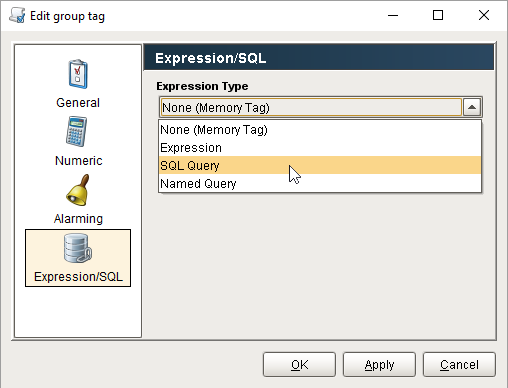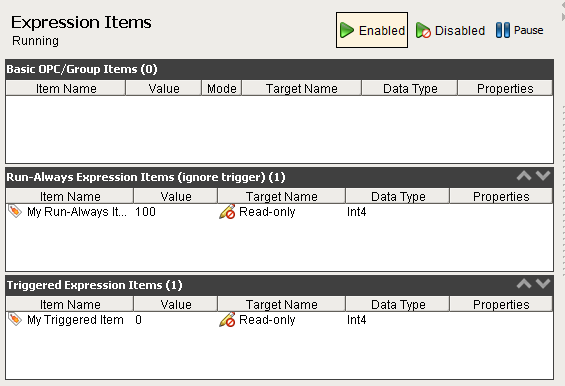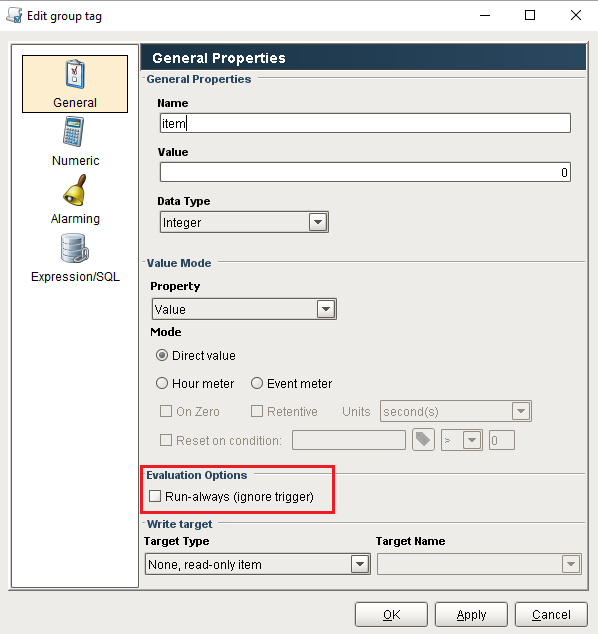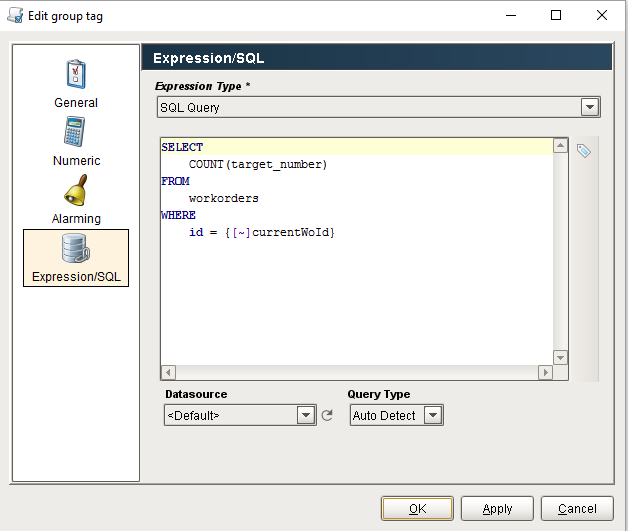Expression Items
Expression Items are items not driven by a PLC. Instead they allow you to configure a static value, or use some other means to automatically set a value, such as a query. They are useful for executing comparisons, simple math, and looking up values from other database tables.
Much like OPC Items, Expression Items can have alarms configured, as well as numeric scaling applied directly to the item.
Scope
It is important to understand that an Expression Item only exists within its group, and can not be referenced by items in other transaction groups, Tags, and any components on a window. The only exception is to use an Expression Item to store/retrieve a value with storeVariable() and getVariable() functions. These functions store values in a space that is accessible by all Transaction Groups.
Execution Order
All Expression items will evaluate in order from top to bottom. This means referencing an Expression Item above will pull the new value, but referencing an Expression Item below will give you the value from the last group execution.
Expression Type
How an Expression Item determines its value depends heavily on its type.

- None: Behaves similar to a Memory Tag in that the value does not automatically change.
- Expression: Uses Ignition's Expression Language to determine the value on the Item. The expression can reference other items in the group, as well as Tags.
- SQL Query: Utilizes a SQL query to determine the item's value. Thus, a query can execute on the item and the results can be referenced by other items in the same group.
- New in 7.9.4Named Query : Named Queries can be called from an Expression item.
Run Always vs. Triggered Items
Expression Item can be configured in two different evaluation states:
Triggered Expression Items executes only when the transaction group is triggered. However if the group is not configured to execute on a trigger, then the item will evaluate every time the group executes (similar to how the Run-Always state works). This is the default evaluation state new Expression Items use.
Run-Always Expression Items will run before the group trigger is checked, so it always executes at the group's rate. This allows your expression to always evaluate regardless of the trigger in the group. Additionally, this state allows you to use the Expression Item as the trigger for the group. We advise that you never have a Target for a Run-Always Expression item because it always runs.

Changing the Evaluation State
Toggling between the two modes can be accomplished by dragging and dropping the Expression Item to either the Run-Always Expression Items table or the Triggered Expression Items table. Alternatively, the evaluation state can be changed by editing the Expression Item and toggling the Run-always (ignore trigger) checkbox.

SQL Queries and Expressions
Expression items can use SQL statements and Ignition's Expression language to automatically determine the value of an Expression Item. This is useful in scenarios where you want to use a value from the database as the trigger for the transaction group, or aggregate several other items in the group into a single value.
Expressions and queries on an Expression Item can reference the value of other items in the group or Tags in the system by clicking on the Tag icon .
There are several Expression functions available that exist only for Transaction groups. You can find them in the Store and Forward and Variables sections of the f(x) function list.

Expression Item Properties
The following properties are available when editing an Expression Item
| Property Name | Description |
|---|---|
| Name | The name of the OPC item in the group. There cannot be duplicate names within a group. |
| Value | The static value of this Expression item. This will be overwritten by an Expression/SQL binding. |
| Datatype | The datatype values are stored as. |
| Property | Which property of the OPC item you want to use.
|
| Mode | Options for displaying values based on the item value.
|
| Evaluation Mode | Run-always (ignore Trigger) - When selected, this causes the group to evaluate at each group interval, before the trigger state is evaluated. |
| Write Target | Target Type - This is the selection for what the Item will write to when the group executes.
|
In addition to properties above, expression items share some common properties with tags.
- Numeric properties can be found on the Tag Scaling Properties page.
- Alarming properties can be found under the Alarming Properties section of the Tag Properties page.
- Expression/SQL Properties can be found under the Expression/SQL Properties section of the Tag Properties page.
